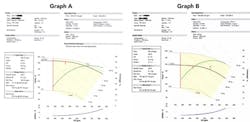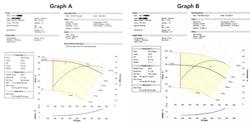Process Puzzler: Ponder The Pressure Drop
This Month’s Puzzler
At our refinery, the mechanical seals on the pump in the heavy gas oil (HGO) pump-around on the pipe still (see figure) failed about once every two years. The pump manufacturer told us the pump, which delivers 339 gpm, wasn’t operating within its most efficient range and would experience fewer problems if we moved the operating point closer to the best operating point. So, a year ago, we trimmed the pump’s impeller to 11.75 in. from 12.75 in. We also increased the minimum-flow restrictive orifice (RO) diameter to maintain 194-gpm flow. Before trimming, the 4-in. control valve ran at 50%; initially after trimming, it ran at 67% — but this has been creeping up ever since and now is at 73%. A month back, we started to notice poor distribution in the return line to the crude distillation unit (CDU). The pressure drop across the spray nozzles should be about 6 psi but now reaches 9 psi. Is the trimming causing our problems? Should we go back to the old impeller? Can we increase the RO diameter to reduce wear on the seals even more? What other symptoms should we look for? What’s our path forward?
Focus On The Spray Nozzles
Trimming the pump impeller and increasing the recirculation rate through the restriction orifice will reduce the pump discharge head. Therefore, the extra opening in the flow control valve (from 50% to 67%) is in the expected direction.
Unless metal shavings were left in the impeller in the machine shop, trimming the impeller won’t change the flow/pressure-drop characteristics of the spray nozzles. Either damage to the spray nozzles or fluid changes could lead to a change in pressure drop.
Fluid changes include both flow rate and density. It would be unusual for such a large density change. Have you checked your flow rates? For a change in measured pressure drop from 6 psi to 9 psi, a flow rate change of roughly 20% would be required. If the flow meter calibration is off, having a 20% error in the flow rate measurement is possible.
The other source of pressure drop change would be spray nozzle or spray header damage. The most likely source is plugging. Line scale, fouling and solids entering the process are all possible. At a minimum, spray nozzles should have startup strainers installed upstream of them to prevent plugging at startup. If the lines are carbon steel, permanent basket strainers should be installed to prevent scale from plugging them. All piping downstream of the basket strainers should be chrome-alloy (minimum).
One final note: I’d suspect that these spray nozzles have had plugging problems in the past. Five psi is the lower limit of getting a typical spray nozzle to develop a spray cone. Running a nozzle right at this limit normally happens when trying to use the largest possible nozzle for the flow rate.
Andrew Sloley, principal consultant
Advisian (Worley Parsons Group), Houston
History Matters
It’s too early to know if the pump manufacturer was correct about trimming the impeller because seal failure only happens every two years. If you have some downtime, you could pull the seals for inspection but this may tell you nothing. Wait and see. Clearly the current problem has nothing to do with seal failure. See Figure 1 a and b.
Control valves respond by increasing the %-opening because of downstream pressure drop. This increase could be gradual or sudden; it could come and go. You should take some samples from the tower and run gamma log analysis to evaluate tower performance. Temperature profiles won’t tell the whole story; some kind of chemistry is going on.
You must look at the equipment most prone to show an increase in pressure drop. Spray nozzles have the smallest opening and will be the most sensitive to fouling. Next, check tubing and, then, the shell-side of a heat exchanger. Chances are any fouling affecting the control valve will appear elsewhere much sooner.
Getting back to the RO: no, don’t increase the recirculation flow until you verify the effects of the impeller trimming. Recirculation consumes energy; so, keep it as low as practical. There is another thing to think about: maybe this fouling always existed. Perhaps the engineer who “oversized” the impeller knew about it. Now, you’re stuck treading water until you identify the fouling and deal with it.
As for the ultimate cause of the fouling, look to your desalters and crude blending; another concern may be the treatments added to manage fouling. Sometimes, the cure is worse than the disease. HGO tends to foul tower sections; you may want to consider modifying the tower trays if the fouling persists.
Dirk Willard, consultant
Wooster, Ohio
Figure 1. After impeller trimming, the pump operates far closer to its best efficiency point.
May’s Puzzler
We are experiencing some startup problems in our distillation train, which consists of three towers. When we start up the plant, the product from the reboiler of the second tower is hotter than desired, which delays the overall plant startup. Our condenser load is too high at this time. What is causing these issues and how can we address them?
In addition, during a turnaround, we mixed up the wiring on the three reboiler product pumps. We’re now working on a control-system-migration project and need to quickly sort out the wiring problem with the pumps to avoid a long startup. What should we do?
Lastly, we replaced the condenser thermal control valve in the product tower. While doing the final hydrostatic test in-place, we couldn’t completely close the spring-open valve. Is there a workaround for this problem so we can get up and running?
Send us your comments, suggestions or solutions for these questions by April 15, 2016. We’ll include as many of them as possible in the May 2016 issue and all on ChemicalProcessing.com. Send visuals — a sketch is fine. E-mail us at [email protected] or mail to Process Puzzler, Chemical Processing, 1501 E. Woodfield Rd., Suite 400N, Schaumburg, IL 60173. Fax: (630) 467-1120. Please include your name, title, location and company affiliation in the response.
And, of course, if you have a process problem you'd like to pose to our readers, send it along and we'll be pleased to consider it for publication.

